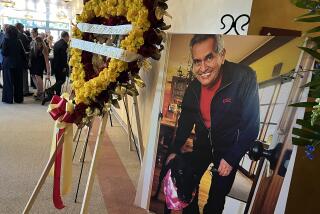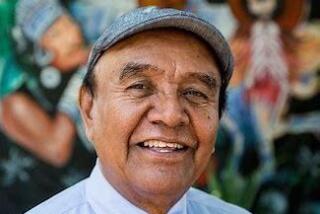Ralph Yarborough; Populist Texas Senator
- Share via
AUSTIN, Texas — Ralph W. Yarborough, the only Southern senator who voted for the 1964 Civil Rights Act, died Saturday. He was 92.
He died at his Austin home, said an assistant in Yarborough’s law office. Despite his age, Yarborough had continued to practice civil law, focusing primarily on the oil and gas business, she said.
“He was really a hero, a guy willing to take on the powers-that-be, take ‘em by the scruff of the neck and go right after them,” said Jim Hightower, a legislative aide to Yarborough in the late 1960s. “I wish we had 10 more like him in national politics today.”
Yarborough, a populist Democrat, served in the Senate from 1957 to 1970, when he lost a primary to Lloyd Bentsen Jr.
In November 1963, President Kennedy went to Dallas in part to heal a split in the party between a liberal faction led by Yarborough and other party leaders, including then-Gov. John Connally and Vice President Lyndon Johnson.
Because of the feud, friends said, Yarborough was not riding in the convertible in which Kennedy and Connally were shot; he was in the motorcade’s second car.
“Ralph Yarborough really never flinched from being labeled a liberal, and I salute him for that,” said Liz Carpenter, who was press secretary to Lady Bird Johnson.
A flamboyant orator whose backers threw pocket change and dollar bills into a blanket as he spoke, Yarborough was the only senator from the old Confederacy to vote for the 1964 law that banned discrimination in voting, jobs and public accommodations.
He chaired the Senate Labor and Public Welfare Committee, sponsored a Cold War GI Bill to extend education benefits to 5 million postwar veterans, and was author or coauthor of the first Bilingual Education Act, pollution and crime control laws and increases in Social Security benefits.
In a 1970 interview with The Dallas Morning News, Yarborough reflected that a political career is “terribly difficult on your family. You take a terrific loss financially if you play it straight; so your family suffers, of course. You have to regret all the hardships on your family. But I don’t regret at all having gotten into politics. I am always encouraging young people toward public service, although I warn them about the sacrifices and the pressures and the disappointments.”
He is survived by his wife, Opal; a brother, two sisters and three grandchildren.
More to Read
Sign up for Essential California
The most important California stories and recommendations in your inbox every morning.
You may occasionally receive promotional content from the Los Angeles Times.













